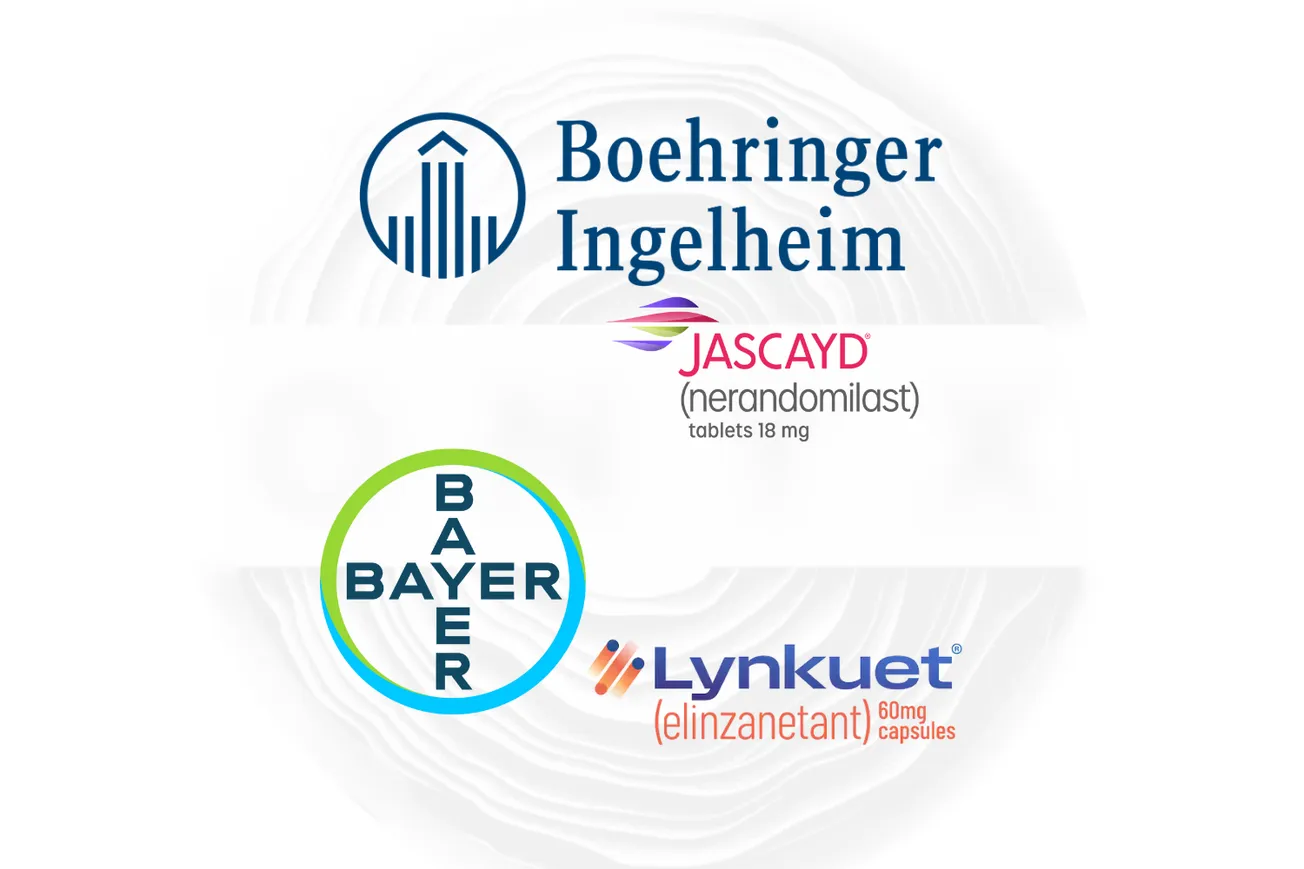Table of Contents
In October, the U.S. Food and Drug Administration delivered two approvals that represent a shift in dynamics in underserved therapeutic markets: rare lung disease and women's health. On the 7th, the FDA approved Jascayd (nerandomilast) from Boehringer Ingelheim for idiopathic pulmonary fibrosis (IPF), representing the first new U.S. therapy for the disease in more than a decade.
On October 24, the regulator cleared Lynkuet (elinzanetant) from Bayer HealthCare Pharmaceuticals for moderate-to-severe vasomotor symptoms of menopause.
Each decision points to a broader realignment in pharma, notably with fewer bets on scale, and more on specialization, with success defined not by reach but by precision and relevance to unmet need.
Jascayd: The First New IPF Agent in a Decade
Nerandomilast is an oral, preferential phosphodiesterase-4B inhibitor. It exerts both immunomodulatory and anti-fibrotic effects, slowing lung function decline in idiopathic pulmonary fibrosis via a mechanism distinct from the tyrosine-kinase inhibition of nintedanib or the multi-pathway activity of pirfenidone.
The FDA approval followed the Phase III FIBRONEER-IPF trial, which enrolled 1,177 patients and showed statistically significant reduction in forced vital capacity decline (FVC) at 52 weeks versus placebo.
Jascayd 18 mg twice-daily reduced the annual FVC decline versus placebo, with higher discontinuation rates. Diarrhea was the most common adverse reaction.
A companion FIBRONEER-ILD trial in progressive pulmonary fibrosis also met its primary endpoints. The prescribing information confirms that Jascayd is labeled for adult IPF patients.
IPF is a disease with high unmet need, poor prognosis and limited therapeutic options. The absence of a new agent in the U.S., for more than a decade, significantly amplifies Boehringer's opportunity.
Jascayd positions Boehringer Ingelheim to strengthen its rare-disease pipeline footprint, expand its interstitial lung disease presence, and gain early-mover advantage in the next wave of fibrosis therapeutics.
From an investor standpoint, the approval may serve as a platform for label expansions and could shift competition with incumbent players in the antifibrotic arena, pending regulatory review.
For payers and providers, the challenge will be cost-effectiveness and real-world adherence, but the novelty of mechanism and clear unmet need underpin premium pricing potential and recognition value.
Lynkuet: Clinical Innovation in Menopause Care
Elinzanetant is a first-in-class, once-daily oral antagonist of both neurokinin-1 and neurokinin-3 receptors. It acts on KNDy neurons in the hypothalamus to modulate thermoregulatory signaling, thereby reducing hot flash frequency and severity. Blocking NK1, in addition to NK3, differentiates it from earlier NK3-only agents.
The Phase III OASIS-1 and OASIS-2 trials enrolled 796 women using Lynkuet 120mg once-nightly, and met co-primary endpoints of change from baseline in frequency and severity of moderate-to-severe vasomotor symptoms at Weeks 4 and 12.
A 52-week safety extension demonstrated tolerability in 1,420 treated women. Adverse events included somnolence and liver enzyme elevations warranting monitoring.
In a women's health market dominated by hormone-based therapies and off-label options, Lynkuet offers a non-hormonal, dual-receptor targeted oral alternative. Bayer predicts Lynkuet will be an available treatment for U.S. patients from November 2025.
Competitors include Veozah (fezolinetant) from Astellas, which targets only NK3. The broader receptor coverage may allow Bayer to claim clinical differentiation, enabling premium positioning and supporting the company's projection of peak annual sales exceeding $1 billion.
From a market standpoint, Lynkuet enters as an innovation launch in a largely static segment. This pill has the potential to shift treatment paradigms for menopausal women, particularly for those who cannot, or don’t want to, use hormone replacement.
The challenge for Bayer will be securing favorable reimbursement and physician adoption in a crowded self-care landscape.
The Strategic Brief
Lynkuet represents a growth-oriented launch in an under-invested women's health segment, providing a non-hormonal, differentiated product with significant commercial upside for Bayer.
Jascayd is a strategic inflection point for Boehringer and the fibrosis therapeutic class, meaningfully expanding effective treatment options and laying groundwork for further label expansion.
Together, these approvals demonstrate a broader industry trend where big pharma are pivoting to specialized, high-margin therapies in niche and underserved markets, which will be key to future pipeline value in non-blockbuster eras.
Sources
U.S. FDA prescribing information - Lynkuet - 10/24/2025
FDA Announcement for Jascayd - 10/07/2025
Bayer HealthCare press release - 10/24/2025
Boehringer Ingelheim press release - 10/9/2025
Reuters - US FDA approves Bayer's menopause relief drug (Lynkuet sales projection) - 10/24/2025










Comments